Where are all the female economists?
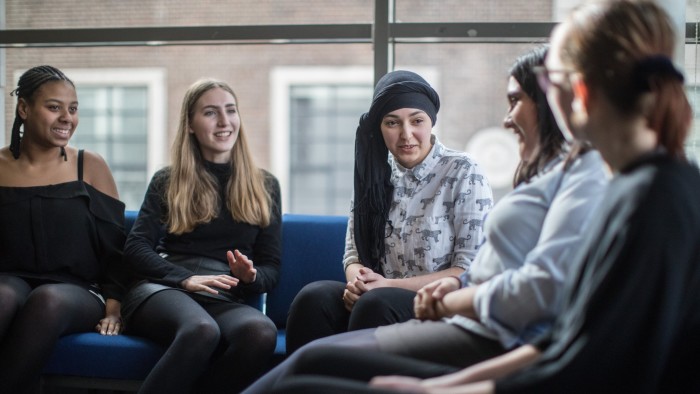
Simply sign up to the Business education myFT Digest -- delivered directly to your inbox.
Economics affects everyone and people need to know more about it, says 18-year-old Emily Lee-Williams, who is studying the subject at St Marylebone, an inner-London state school. “But it seems quite intimidating in the media . . . If you think of an economist, you think of a rich man in a business suit who is so much higher up than you are.”
Many in the profession are worried that too few women work in economics at senior level. But only recently has the source of much of the problem been identified: women are far less likely than men to study economics, let alone pursue a career in it.
Just over a third of undergraduate economics students in the UK are women (overall, 57 per cent of undergraduates are women). The picture is similar in Australia and the US.
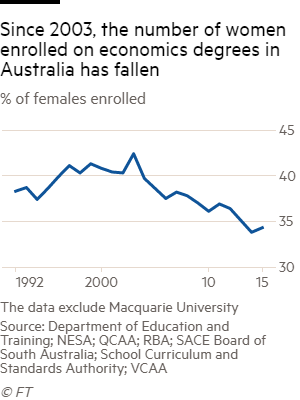
“My initial thinking was that for some reason female economists were out there but not applying to the Government Economic Service,” says Osama Rahman, who jointly leads a team trying to boost the number of women among the ranks of UK civil service economists. “It was only later I realised there was a problem with women not choosing to study economics.”
The subject was once at the forefront of women’s educational emancipation. The first coeducational university lecture in the UK was conducted by a professor of political economy at University College London in 1871. But, while other traditionally male subjects such as engineering have made progress in attracting women, economics has struggled.
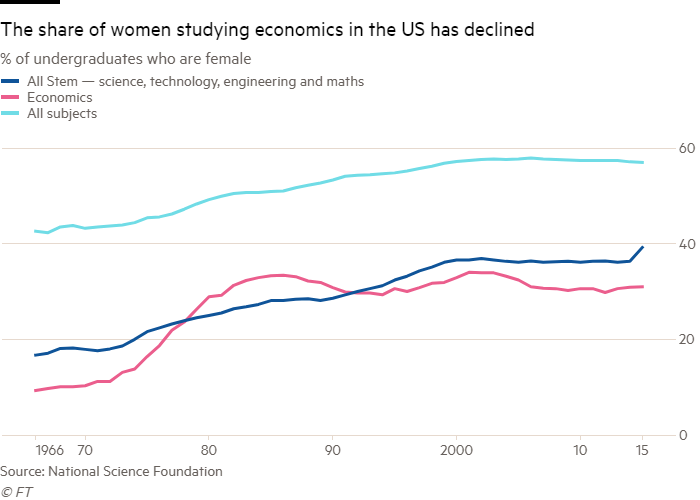
Image problem
One explanation frequently given for why so few women study economics is that the mathematical nature of the subject puts them off. This does not stand up to scrutiny, as the share of women among maths undergraduates exceeds that in economics.
But economics does have an image problem. Kawthar Msrar at St Marylebone school says: “It is still seen as a very male-oriented job; there is not a widespread realisation yet that girls can do it, too.” Her classmate Bryony Jones agrees: “As a mixed race woman, I don’t see anyone who looks like me doing economics.”
Elinor Ostrom (1933-2012) remains the only woman to have been awarded the Nobel Prize in Economics. Rachel Griffith, professor of economics at Manchester University, will next year become only the second female president of the Royal Economic Society since its creation in 1890. The American Economic Association has gone only one better during its 133-year history.
Another issue is the mistaken belief that economics is about money and forecasting. Claudia Goldin, a professor of economics at Harvard, plays the “Uber game”: “take an Uber, tell the driver you’re an economist, and nine times out of 10 they will ask you to predict the economy or the stock market.”
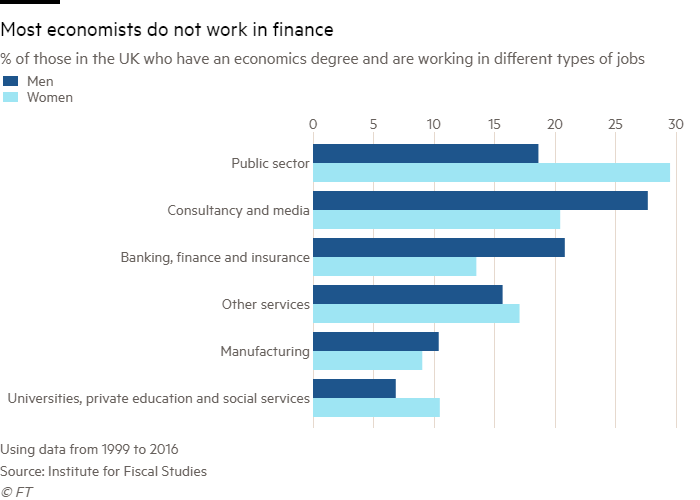
In fact, economists work in a wide range of areas, from designing policies to improve child nutrition to examining the balance of power between employers and employees and the rise of “deaths of despair” among white working-class Americans. Economic practice — focusing on social policy issues — is another little-known field.
The Australian, UK and US central banks have campaigns to encourage women to take up economics. And having just missed its targets for increasing the number of women in management positions, the European Central Bank is thinking about how it can encourage women to study the subject.
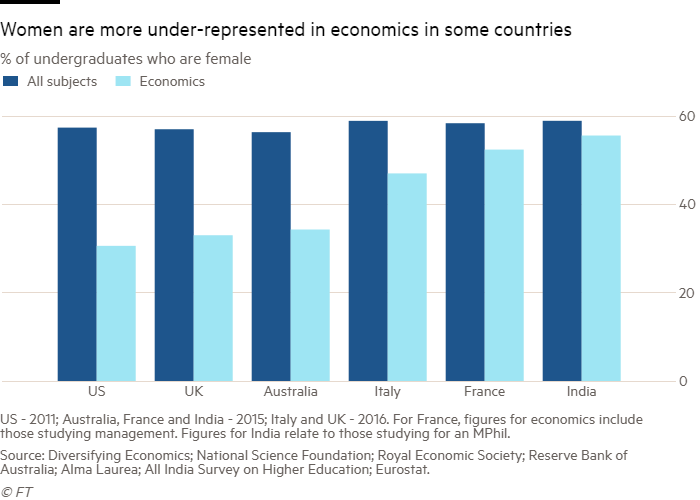
In the UK, economics graduates rank second — behind graduates in medicine — in average earnings, according to data from the Institute for Fiscal Studies. Female economics graduates earned on average £20,000 more a year a decade after graduation than creative arts graduates. But typically, women place less weight than men on financial return when choosing which subject to study.
Economics majors were also more likely than those in any other subject to head an S&P500 company. Differences in career choice are an important factor driving the gender pay gap.
Economists are influential in public policymaking, from setting monetary policy to designing systems to allocate donor organs. Here, “the under-representation of women matters because it affects what questions economists look at”, says Sarah Smith, a professor of economics at Bristol university and chair of the RES’s women’s committee. “Ultimately it affects the advice given on public policy issues.”
There is no single explanation for the under-representation of women in economics. “Social norms that go back a long time may dictate who studies what,” says Homa Zarghamee of Barnard College in New York.
Even when economics undergraduates do not pursue a career in the field, an understanding of the basics has benefits. “Everyone should be able to pick up and read a great newspaper,” says Prof Goldin. “If one of the goals of education is to be able to read and understand what’s in it and to be able to question economics critically, taking an elementary course in economics is extremely important.”
That has been the experience of 17-year-old Zaira Khanzada at St Marylebone school. “Since I was young, I would watch BBC News with my dad, and there would be so many things I did not understand,” says Ms Khanzada. “But studying economics has really helped; everything has clicked.”
A total of 1056 people, from 102 countries, responded to the survey — 56% are women
Source: Carrington Crisp —’Tomorrow’s Masters 2017’
What works
Many campaigns have sprung up to try to encourage women to study economics. Prof Goldin is co-ordinating a series of experiments across 20 US universities and colleges, including mentoring and improving knowledge of career paths for economists.
One US college found that women who achieved less than an A minus in its introductory economics course were significantly less likely to major in the subject than those awarded higher grades. In contrast, male students’ decision to continue with the subject was virtually unrelated to the grade they achieved.
The different ways men and women respond to feedback on their performance is not unique to economics. But economics is often graded harshly, meaning the problem of women being discouraged may be particularly severe.
Wendy Carlin, a professor of economics at UCL, leads a global campaign to change the way economics is taught, motivated by a desire to increase the appeal of the subject. The Core programme takes a more interdisciplinary approach to teaching economics, using extensive references to real-world problems rather than starting from abstract models.
“If we want to attract a wider group of people into economics, we need to talk in a language they understand,” says Maeve Cohen, director of Rethinking Economics, a student-led campaign to tackle what it sees as an out-of-touch, narrow and uncritical approach to teaching economics.
Economics is not just — or even mainly — about finance or forecasting the macroeconomy. But the discipline has work to do to broaden its appeal beyond socially-advantaged men.
Socio-economic status and economics
In both the UK and Australia there is concern about the lack of socio-economic diversity among economics students.
In the UK, students from the least-deprived backgrounds are more likely to study economics at university than those from the most-deprived backgrounds. And even if state school pupils are offered economics, it is often taught by someone who specialises in another subject, such as geography or business studies. The only specialist training course for economics teachers in the UK closed this year.
A member of the Bank of England’s early careers recruitment team says that on a recent visit to a state school she was asked by the head of economics what the difference was between the Bank of England and a high street bank.
“If you are passionate about the subject, that comes across to your pupils,” says Rebecca Roden, head of economics and business at St Marylebone School, who studied economics at university.
“If you are not confident in the subject, I can imagine it is much harder to relate the theory to real-world issues to make it interesting and relevant to your pupils.”
Having a school-level qualification in economics is not a prerequisite for entry on to most undergraduate economics courses. But students are more likely to choose economics if they are exposed to it at school.
Letter in response to this article:
Economics creates many opportunities for women / From Lorraine Ruffing, Annecy, France
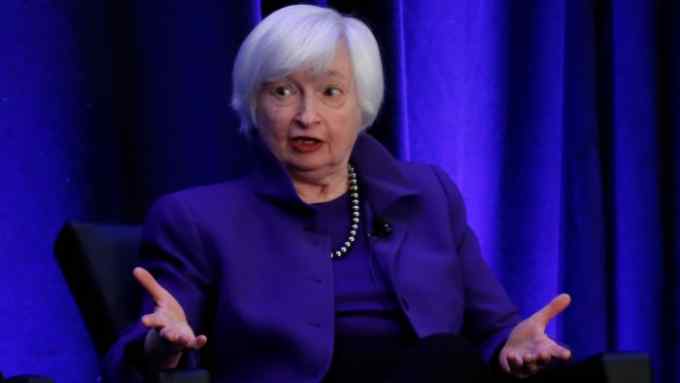
Comments